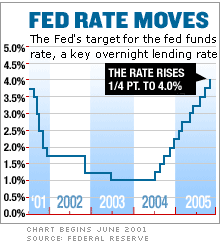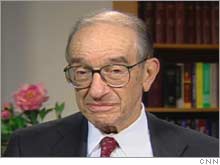 |
 |
| Outgoing Fed Chairman Alan Greenspan remains wary about inflation, even though he is encouraged by productivity growth. |
|
|
|
|
|
NEW YORK (CNN/Money) -
The big jump in business productivity is clearly good news for Wall Street, pointing to less inflationary pressures in the world's largest economy and propping up the outlook for corporate profits.
It's also likely to take some pressure off the Federal Reserve, which has been raising interest rates in its efforts to ward off inflation, economists said.
But at the same time, the report contained some troubling news for most American workers. Wage growth, which is supposed to rise in the long run as the economy grows and workers become more productive -- isn't.
Productivity, a key measure of worker output, rose at a 4.1 percent annual rate in the third quarter, the best showing in more than a year and nearly double the rate of the prior quarter, the Labor Department reported.
The increase allows companies to produce more while keeping costs under control -- a good sign for corporate executives and investors worried about slowing profit growth.
The department also said that a key measure of labor costs fell 0.5 percent in the quarter, versus Wall Street forecasts for a 2 percent increase. That's also good news for CEOs, policy-makers and investors who've been concerned that rising energy costs could force prices and wages higher, leading to a surge in inflation.
"These numbers are very encouraging because what we've had in the stock and bond markets is almost an obsessive phobia about an upcreep in inflation," said Anthony Chan, senior economist for JPMorgan Asset Management. "What this report does is mitigate those fears."
"Historically you've never seen a surge in inflation when productivity is this robust," he added.
"It's good news for the economy, it's good news for the Fed and it's good news for corporate profits," said John Silvia, chief economist at Wachovia Bank in Charlotte, N.C.
On Wall Street, investors welcomed the news and stocks extended their recent mini-rally, with the Dow Jones industrials rising for the fourth time in the past five sessions. (Full story).
Taking the heat off
Economists said the productivity report takes a lot of pressure off policy-makers at the Fed, who raised short-term rates on Tuesday for the 12th straight time, pushing the closely watched fed funds rate to 4 percent, up from 1 percent before the rate-hiking campaign began. (Full story).
The central bank is now all but certain to stop raising rates sometime early next year, when the fed funds rate is about 4.5 percent, economists said. Some on Wall Street had been worried that more signs of inflation could force the Fed to push the fed funds rate, an overnight bank lending rate, much higher.
"It lets the Fed feel more comfortable raising only at a measured, and not an accelerated, pace," said JPMorgan's Chan, noting there's been some "wild talk" in financial markets that Fed Chairman Alan Greenspan might get a lot more aggressive before handing over the reins in January.
"I think the Fed will stop between 4.5 percent and 4.75 percent, maybe 4.5 at the handoff and maybe Bernanke will just do one (more quarter-point rate hike) right out of the box to quell fears that he's soft on inflation," Chan added.
President Bush has nominated Ben Bernanke, chairman of the White House's Council of Economic Advisers and a former Fed governor, to succeed Greenspan, who's been at the helm of the Fed for more than 18 years. (Full story).
In his last appearance before Congress on Thursday, Greenspan said that while the economy continues to perform well, boosted in part by solid productivity growth, inflation remains a concern. (Full story).
Lubricating growth
The reason the Fed chairman focuses on productivity is that when it is rising, it helps keep the economy growing with less upward pressure on inflation. The surge in productivity that started nine years ago was one of the keys to the New Economy boom in the late 1990s.
But there are some troubling signs in the latest productivity report.
The drop in unit labor costs, for example, while encouraging for corporate CEOs, is just the latest indication that wages aren't keeping pace with economic growth, or with inflation.
"This kind of report makes central bankers very happy," said Jared Bernstein, economist at the left-leaning Economic Policy Institute. "There's no evidence of any inflationary pressures that couldn't be absorbed by productivity growth."
"But if you're a working family, the compensation numbers in the report are a real concern," he added.
In its report, the department noted that compensation, adjusted for inflation, actually fell in the third quarter after being little changed in the second quarter. Before that, "real compensation" had risen for seven of the previous nine quarters.
"Any economic textbook says compensation will rise with productivity. But that hasn't been happening, and that's disconcerting," Bernstein said.
-------------------------------
Why have some investors been worried about Ben Bernanke? Click here.
The inside line on how high the fed funds rate will go. More here.
For more on the Fed and rates, click here.

|